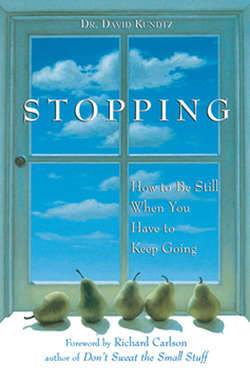Читать книгу Stopping - David Kundtz - Страница 12
На сайте Литреса книга снята с продажи.
ОглавлениеIt's good to have an end to journey toward;but it's the journey that matters, in the end.
URSULA K. LEGUIN
5
Stopping at the Speed of Light
Stopping is paradoxical. It would at first seem, would it not, that if one just stops, that is, does nothing, that it would be a waste of time? Indeed, a way to describe doing nothing is “wasting time.” And when you feel stressed and have too much to do, doing nothing may feel like the worst approach. But paradoxically, doing nothing turns out to be not only not a waste of time, but some of the most significant time you can spend, even if it is only for one minute.
This idea flies in the face of current belief and practice; “Do more and do it more quickly” is what we hear. But it is exactly this attitude that has made us overwhelmed. What we've been doing isn't working.
The kind of Stopping that I am suggesting is done while moving at the speed of light. Stopping while moving at the speed of light is a paradox: To stop on the one hand and to go at the speed of light on the other are contradictory statements that create so radical a paradox that they appear to be an oxymoron. In other words, it doesn't make sense—unless you see it paradoxically! Then it is transformed into an exquisite, inviting, alluring, and richly textured truth: Time spent doing nothing allows us to awaken what is most meaningful and valuable to us.
This soulful truth is actually based on a scientific paradox. The amazing fact is that objects moving at the speed of light no longer experience time. In other words, at the speed of light, time stands still. Scientists assure me that these are true and accurate statements. I don't pretend to understand them scientifically, but I like them. And I like to apply them to Stopping: Stopping is time standing still or standing still in time.
Stopping at the speed of light acknowledges that the Stopping takes place within the context of a very fast world that waits for no one and, if you can't keep up, will leave you behind. It also acknowledges something that many people who teach spirituality are resistant to accept: going fast is not necessarily bad. Many of the “technologies that promote speed are essentially good. The historical record is that human beings have never, ever opted for slowness,” says Jay Walljasper, an editor at The Utne Reader. “When I hear friends complain that their lives move too fast, they're not talking about a wholesale rejection of speed so much as a wish that they could spend more of their time involved in slow, contemplative activities.” The problem, of course, is that there is way too much of one and not enough of the other. Stopping can restore the balance.
Many of us love the “revved-up beat of dance music, the fast-breaking action of basketball, or the speedy thrill of a roller coaster, but we don't want to live all our lives at that pace,” says Walljasper. “A balanced life with intervals of creative frenzy giving way to relaxed tranquillity—is what people crave.” Yes—and that's what Stopping is about.
The ultimate purpose of Stopping is going. But Stopping at the speed of light is not an unfulfilling, endless switching back and forth between going too fast and being dead still. Rather it brings its results—its gifts—to the person, not to the rate of speed. Its wonders are worked in the soul and thus are part of the person no matter what the speed of the moment.
Stopping ten times in a very hectic, emotionally demanding day doesn't feel like a jerky motion, but feels like a smooth flow moving in a balanced way through the day. The results are that you come to the end of the day not limp, exhausted, and depressed, but okay and, with appropriate rest, ready to continue with enthusiasm.
